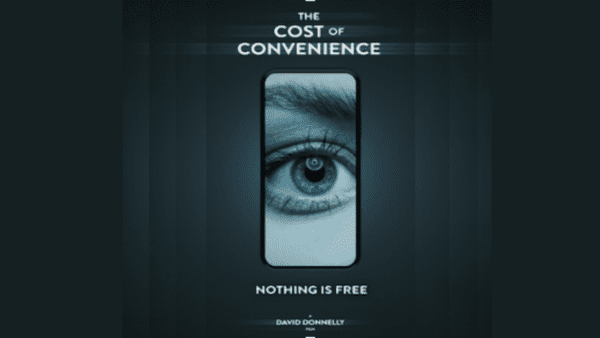The Dark Side of the Surveillance Economy and What Retailers Should Do About It


Businesses across the spectrum have benefited hugely from the rise of the “surveillance economy” — the business of gathering and using data about consumer behavior for profit — but the impact to consumers is much less straightforward.
Yes, consumers now have access to never-before-seen levels of personal technology and convenience, but the idiom “there’s no such thing as a free lunch” also has never been more true. In recent years the price of these “free” tools has come into focus: loss of privacy, mental health issues, overconsumption that is having a grave environmental impact, political unrest and human rights violations, to name just a few.

Alarmed with the rapid shift in his own family’s technology usage during the pandemic, filmmaker David Donnelly turned his professional lens on the topic to explore the consequences of rapid technology adoption. His film, The Cost of Convenience, dissects the wide-reaching impact of our seemingly unquenchable desire for connectivity, speed and flashy devices. The film was independently financed and can currently only be purchased on a dedicated website, although it will be made available for purchase on the streamers later this year.
“Our agents weren’t thrilled with the approach, but we wanted to retain the integrity of the project, so we deliberately didn’t go through networks or co-productions; everyone from Amazon to Netflix is part of this larger algorithm-driven machine,” Donnelly explained. “We also got a lot of pressure from people to politicize it, but I don’t see this as political; it’s very bipartisan. I’m actually hoping that this unites us — this is something that everyone can agree on and should bring us together as Americans.”
Donnelly sat down with Retail TouchPoints to share what he learned about our surveillance economy and what a more ethical, healthy path forward might look like for both consumers and companies.
Retail TouchPoints: The film details quite a wide range of issues that have arisen as a result of surveillance capitalism — what would you say is the biggest takeaway?
David Donnelly: The central theme is that managing our relationship with technology is essential in order for us to solve all the other existential crises in our world today. Almost all of these major issues that we see as we doom scroll can be connected to our relationship with technology. If we don’t start to manage that relationship, get ahead of it and lay down some value systems that we can all agree on — as business owners, as consumers, as concerned citizens, as parents — then we’re going to keep seeing the same problems over and over and over again with each new iteration of technology, because it moves faster than our ability to regulate it.
Executives from TikTok and Facebook have been under the gun by Congress, and that’s great, but now there’s AI and deep fakes; we’re constantly behind. The main theme of the film is that these things are connected — it seems like we have so many different problems to deal with today, but what if they all have the same root cause?
RTP: How much of this is due to the basic nature of a market economy? Do you think it’s possible for a company to make a decision on moral or ethical grounds that will be counter to its financial success?
That’s a dilemma that I think a lot of people find themselves facing, especially as business owners. And the truth, which is quite terrifying if you’re a business owner, is that these laws are going to change. A lot of the stuff that people are doing now is going to be illegal, and the only companies that will be able to survive the amount of legal fees and penalties [coming down the pike] are going to be huge companies. Any business that wants to survive in the long term is going to have to make changes, because the legislation is starting to change.
Meanwhile, if it is legal, then yeah, you have a fiduciary duty to maximize your shareholders’ value. I understand that, and I’m certainly not making an argument for a different type of economy than the one we have now. But if that economy is based upon surveilling consumers, there’s an inherent betrayal. That just can’t possibly be sustainable over a long period of time, especially as consumers become aware of it.
I think a lot of people, especially younger people, would willingly still give away their data; it just needs to be a choice. Also, some of this stuff just needs to be voted on, and maybe people will vote for certain things to [stay as they are]. But I think there’s a risk in maintaining the status quo and not starting to look two, three years ahead when the way that we’re collecting data right now might no longer be legal.
Susie Alegre, a renowned human rights attorney, is in the film. In the UK, she’s making a very strong argument that the way this surveillance capitalism model works is violating human rights by challenging our human autonomy. I do think there has to be some element of a moral obligation if you’re on the wrong end of that. Certainly, what Meta and some of these other companies were doing was just wrong. They had the data to see [that their platforms] were causing really serious mental health issues in kids. I think we’re just starting to see the beginning of all this backlash.
I’m not a Luddite. Everyone in the film uses technology. There just has to be transparency. Once that transparency and trust is there, I think brands will be able to still have a data exchange that is a win-win. But it’s going to take some really smart people to figure out how to connect with consumers [responsibly]; these are still new roads.
RTP: The film focuses primarily on the central actors in all this — Google, Meta and the like — but thousands of companies have benefited immensely from this surveillance ecosystem. What can these “second tier” companies, those that don’t create the technology but are using it, do to mitigate the harm they may be causing?
Donnelly: At a basic level, giving people more control over their data in the long run is going to be a smarter strategy. There are so many things that people still don’t even realize are happening. As people start to figure this stuff out, there is going to be backlash, and I think that is just now starting. Brands that really want to get ahead are going to start taking “digital wellness” approaches and have data control policies that are advantageous to consumers.
In fact, it’s already becoming a sign of the next element of luxury. At a lot of luxury outlets, retailers and restaurants, especially in big cities, the new cool thing is to put your phone away in a locker so these spaces become a kind of safe zone where you don’t have to worry about your phone or your privacy. I think this is where the culture is going, and there are a number of companies that are starting to profit immensely from these “digital minimalist” approaches.
RTP: These technologies also enable more relevant, personalized experiences for consumers, so they’re not all bad right?
Donnelly: Absolutely. Part of the problem, especially with the amount of time people are spending in front of screens and working with computer codes of ones and zeros, is binary thinking — something has to be either good or bad. The reality is two things can be true at the same time.
Customers do like it when [a company] knows what they like or that they don’t have to sift through all kinds of irrelevant ads. But there needs to be transparency because otherwise they’re going to feel tricked. [No customer will be happy] to find out that that their favorite brand is harboring 25,000 data points on them that they didn’t know about and working with third parties to find ways to predict their future behavior and capitalize on it. There are going to be so many lawsuits and legislative changes in the next decade. Just look at Europe; they’re way ahead of this with GDPR and other regulations. It’s only a matter of time before this moves into the U.S.
[Hoping customers don’t notice] is a short-term play; it’s not a way to build long-term consumer confidence. Right now [these consent conversations] are embedded in legal verbiage, the “accept”-or-“not accept”-these-terms-and-conditions agreements, but I think we’re going to see that start to backfire in the near future. People are going to become more aware that data has value, and they will want control of their data.
It doesn’t have to be all bad, it can be great, and it can be presented in a way that’s exciting [to consumers]. When done right it shows that you value your customers’ privacy. As a consumer, if you know it’s happening and you want to provide your data to a trusted brand, that’s great. The problem is when it’s not transparent, then you feel betrayed.
RTP: Many consumers seem resigned to the situation — have these apps and devices become so ingrained that there’s no way out, or at least not an easy one?
Donnelly: That’s why we have this surveillance capitalism economy — people do become reliant upon these tools and devices. But I don’t think that the use of technology is bad in itself; this is a systemic issue. And it’s not all on the consumer to change their behavior.
Take, for example, what Apple has been doing in the last couple of years. They have so much data on consumers, even health data, but people feel like they cannot live without their Apple devices. Apple is getting ahead of it by saying, “We really value your privacy” and starting to make it a conversation. How they’re handling it is really smart.
RTP: What do you think of the recent advances in AI, both as a filmmaker, but also through the lens of the film?
Donnelly: As a filmmaker, the tools that we have available now are remarkable. The stuff we’re doing would have cost tens of thousands of dollars to even experiment with. But just like every other technology, there has to be transparency behind it, because we’re not going to able to slow this train down.
There’s so much fear that this is going to get in the hands of China or Russia before the U.S. can crack the code on general AI, and no one has enough power to put the brakes on that. The only thing we can do is self-educate and be informed citizens. We have to demand accountability throughout this process and make it an issue that our politicians care about. This is such a big issue, but you don’t see any politicians bringing it up because so much of their money comes from that industry.
From a retail perspective, the demographic of parents is so powerful. Throughout the filmmaking process and since we started screening the film, that is the audience that has cared about this the most, because they know it’s impacting their families. Brands with a strong customer base in that demographic need to pay attention. There is going to be a reckoning with that audience in particular if they find that there’s been some sort of betrayal when it comes to how their family’s data is being used.











